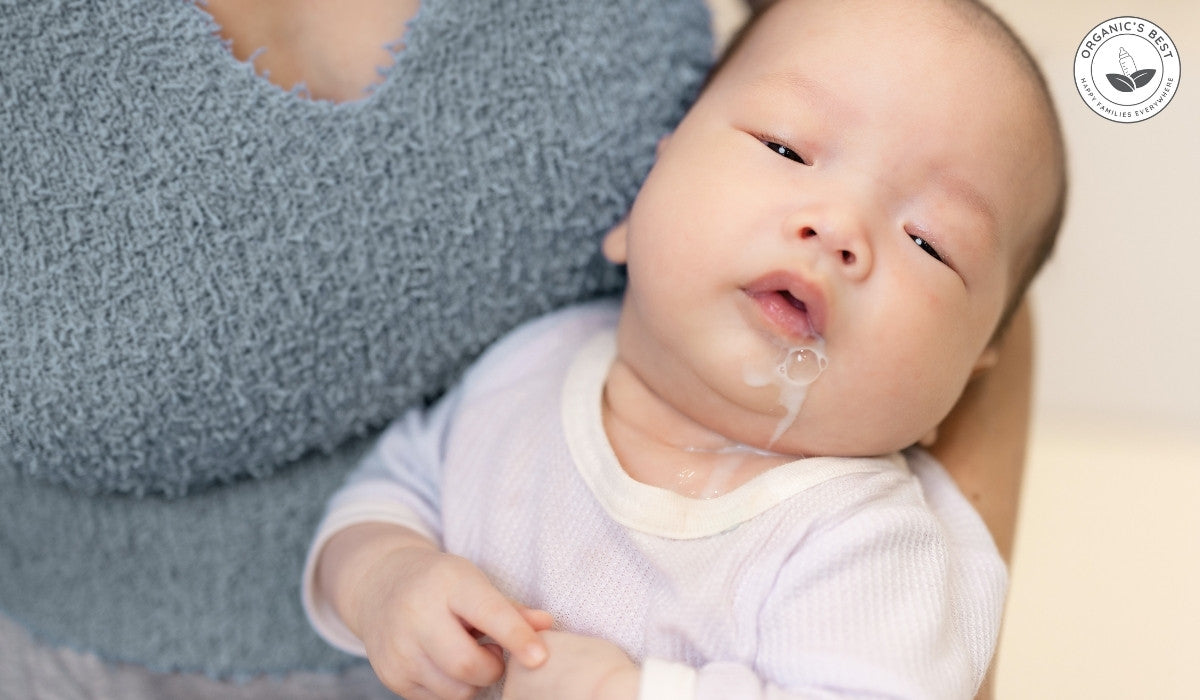Click to Get 2 FREE Boxes/Cans
Only New Customers! Click HERE to Get 2 Extra Boxes/Cans for Free With Your First Order.
BABY FORMULA
Offering new parents top-quality European infant formula from renowned brands like HiPP, Holle, Kendamil, and more. If you’re uncertain about which product to choose, our Formula Finder can help you make the best decision for your baby.
Baby Food
Offering new parents a premium selection of European baby foods, including jars, pouches, cereals, and snacks from esteemed brands like HiPP and Holle.
Everything You Need to Know About Baby Spit Up
by Agustina Fernandez December 10, 2024 7 min read

If there's one universal truth about babies, it is that they come with a lot of laundry. Between spitting up, diaper blowouts, and messy meals, it's easy to feel like you're running a 24/7 laundromat.
Whether they spit up formula or breast milk, this common bodily function is responsible for plenty of outfit changes. While it can be frustrating at times, almost all babies spit up, especially during the newborn phase.
That said, the amount and frequency of spit up sessions can determine whether there's an underlying issue that needs addressing or whether it's simply a normal physiological process at play.
We'll help you pinpoint the difference below as we cover the what, how, when, and why of infant spit up while also offering solutions to reducing reflux for babies who are more prone to making a milky mess.
Table of Contents
Understanding Baby Spit Up
Let's start by looking at what causes spitting up from a biological perspective. Spitting up happens when the contents of a baby's stomach flow back up into the esophagus and out the mouth.
Normally, spitting up is not forceful, and simply drips out of a baby's mouth. So, while it can be alarming the first few times, it's completely normal for most babies and not cause for concern.
So why does this happen? A baby's stomach is about the size of a walnut in the early weeks, and the muscle that keeps food down (the lower esophageal sphincter) is still developing and getting used to the influx of milk. Add in some swallowed air during feedings, and you've got a recipe for spitting up.
The good news? If your baby is gaining weight well and doesn't seem bothered, there's likely no reason to stress. Healthy babies can spit up a surprising amount-but it's rarely a sign of a bigger problem.
Fun fact: According to William Byrne, MD, chief of pediatric gastroenterology at Doernbecher Children's Hospital, babies can spit up as much as 10-12 times a day, with around 70% of infants under 3 months spitting up three times a day.
What Causes Babies to Spit Up?
There are a few reasons why spitting up so commonly occurs throughout infancy, and in general, it's usually a combination of natural development and feeding habits.

Gastroesophageal Reflux Disease (GERD) and Other Medical Conditions
Let's discuss some of the more troublesome conditions that may cause excessive, prolonged, or forceful spitting up. In this context, there are two terms you should familiarize yourself with. The first is gastroesophageal reflux (GER), which is a general term describing the process of spitting up as a result of your baby's liquid diet accompanied by long periods of lying down, swallowing air, and other normal infant habits.
GER is common in babies, but when it is more severe or prolonged, it is called gastroesophageal reflux disease (GERD)-the second term to be aware of. This condition can be uncomfortable and is often accompanied by the following symptoms:
GERD Symptoms to watch for:
-
Poor weight gain
-
Frequent crying during or after feeding
-
Chronic cough or wheezing
-
Difficulty swallowing or gagging
-
Forceful spitting up or vomiting
Rare conditions like esophagitis or gastritis can also cause excessive spitting up, so it's important to rule out medical causes if your baby seems uncomfortable. If you suspect that any of these conditions may be causing your child to spit up, if you notice your baby spitting up a lot all of a sudden, or if you notice your baby spitting up more than usual, we recommend consulting with your pediatrician.
Swallowing Air During Feedings and Gas in the Baby's Stomach
Now let's discover some of the more common reasons for infant and newborn spit up, starting with the fact that babies aren't exactly graceful eaters. They gulp, guzzle, and, more often than not, swallow air. This trapped air can expand in their stomach and push milk back up.
Solutions for swallowing air during feedings:
-
Burp your baby frequently during and after feedings.
-
Use a slow-flow nipple to reduce the speed of milk flow.
Overfeeding or Feeding Too Quickly
It will take a while for babies to figure out their hunger cues. Newborns don't come with a built-in "full" button, and sometimes, they overfeed. Overfeeding can overwhelm their tiny tummies, resulting in babies spitting up.
If your baby keeps spitting up but still wants to eat, try offering smaller, more frequent feedings and watch for cues that your baby is done, like turning their head away or closing their mouth.
Not Feeding in a Semi-Upright Position
Gravity is your best friend when it comes to spit up prevention. Feeding your baby in a semi-upright position and keeping them upright for 20-30 minutes after meals can help keep milk where it belongs and reduce the chances of your baby spitting up a lot after feeding.
If you're dealing with a particularly spitty baby, investing in an infant swing or supportive upright chair might just save your sanity.
Baby Spit Up Color Chart
Let's talk about the colors of the spit up rainbow. Here's a quick cheat sheet to know what's normal:

-
White or milky: Completely normal; it's just digested milk.
-
Yellow or green: Green or yellow spit up could indicate bile, so check with your pediatrician if this persists.
-
Blood-tinged: If you notice blood in baby spit up, seek medical attention immediately. This could indicate irritation or another issue.
You may also notice your baby spitting up curdled milk, which looks like chunky spit up. In this case, curdled spit up results from the milk having time to mix with your baby's stomach acid.
When Do Babies Stop Spitting Up?

Thankfully, this condition is short-lived, as most babies stop spitting up by the time they're 12-18 months old. As their digestive systems mature and they start sitting up more, gravity and stronger muscles take over. In the meantime, stock up on bibs, burp cloths, and laundry detergent!
When to See a Doctor: How Much Spit Up is Too Much?
While most spitting up is harmless, here are some cases where a doctor should be consulted:
Signs of Excessive Spit up
-
Poor weight gain: If spitting up is interfering with your baby's growth, it's important to discuss the issue with a pediatrician.
-
Discomfort or crying during spit up: This could signal GERD or another issue.
-
Spit up vs. vomit: If spitting up frequently seems forceful, as in baby projectile spit up or painful, this could be a sign of a bigger problem.
-
Blood in spit up: If you notice blood in your baby's spit up, seek medical attention immediately.
Finding the Right Formula for Spitting Up
Anti-Reflux (AR) formulas can be a game-changer for formula-fed babies dealing with frequent spitting up episodes. Smaller, more frequent feeds (instead of large, spaced-out ones) can also reduce spit-up in some babies.
The Best Solution: AR (Anti-Reflux) Formula
These specialized AR formulas are crafted to help milk stay in your baby's stomach, reducing the likelihood of your baby spitting up formula and reflux-related discomfort.
The secret lies in their thicker consistency, achieved by incorporating added starch or natural thickeners. This slight thickening effect makes it more difficult for stomach contents to flow back up the esophagus.
HiPP AR (Anti-Reflux) Formula
HiPP Anti-Reflux formula features locust bean gum as a thickening agent, chosen for its ability to promote gentle digestion while effectively reducing reflux. Along with this natural thickener, the formula includes a carefully selected blend of ingredients such as skimmed milk and whey, vegetable oils, lactose, essential fatty acids, and a full range of vital vitamins and minerals.
If you're familiar with HiPP products, you're likely used to their top-quality organic standards. While HiPP AR Formula is not certified organic due to the specialized processing required to meet reflux needs, it remains free from GMOs and adheres to HiPP's renowned high-quality standards.

Conclusion
Spitting up may be messy, but choosing the best formula for spit up, like HiPP AR or another AR option approved by your pediatrician, can help reduce spit up and make life a little easier. Pair that with simple strategies like frequent burping, paced feeding, and upright positioning, and you'll be well on your way to fewer outfit changes (for both you and baby)!
FAQs on Baby Spitting Up
Here are the answers to some of your most asked questions about spitting up.
Why Does My Baby Spit Up So Much?
In general, spit-up is usually a combination of immature digestive muscles and swallowed air, but only your pediatrician can determine the true cause of your little one's spit-up.
Can Babies Choke on Spit Up?
It's a common fear, but babies' gag reflex is highly developed to protect their airways. Still, to reduce the risk, always follow safe sleep guidelines and keep your baby upright during and after feedings. Back is still the safest sleeping position even for babies who spit up.
Do Babies Spit Up More When Teething?
Teething doesn't directly cause spit up, but increased saliva production during this period can make reflux worse for some babies.
Does Spit Up Mean Baby is Full?
Not necessarily. Babies can spit up even when they're not full, it's more about how their stomachs and esophagus are handling the milk.
Should I Feed My Baby After Spit Up?
If your baby seems hungry and content after spitting up, offering more milk is okay. Just keep it in smaller amounts and take breaks for burping.
|
Disclaimer: Please be aware that this information is based on general trends in babies, and it is not medical advice. Your doctor should be your first source of information and advice when considering any changes to your child's formula and when choosing your child's formula. Always consult your pediatrician before making any decisions about your child's diet or if you notice any changes in your child. Breastfeeding is the best nutrition for your baby because breast milk provides your child with all the essential nutrients they need for growth and development. Please consult your pediatrician if your child requires supplemental feeding. |
Agustina Fernandez
Dr. Agustina Fernandez earned her medical degree from the prestigious Universidad Nacional de Córdoba, Argentina. With a deep-rooted passion for pediatrics, Dr. Fernandez is currently on the path to specializing in children's healthcare. Recently, she has delved into the vital field of infant nutrition. Her research interests include breastfeeding, infant formula, and baby food in little ones’ formative years. Dr. Fernandez's commitment to this area of study underscores her dedication to ensuring the health and well-being of children from their earliest days.
Leave a comment
Comments will be approved before showing up.
Also in Organic Infant Nutrition and Health Blog

Spilled Milk: Feeding Unfiltered with Hayley
by Agustina Fernandez February 04, 2026 4 min read
Read More
Baby Bath Guide: How to Bathe a Newborn
by Agustina Fernandez February 03, 2026 8 min read
Read More
Does Your Kid Need More Vitamin D in Winter?
by Agustina Fernandez January 28, 2026 7 min read
Read More
Reviewed by Dr. Bardha Qerimi, MD
-

Dr. Bardha Qerimi: Medical Reviewer of Organic's Best Blog
Dr. Bardha Qerimi completed her medical studies at the University of Prishtina in Kosovo, where she began her journey into the field of medicine. She has since developed a career in medical research, contributing to projects with notable organizations, including the World Health Organization (WHO).
